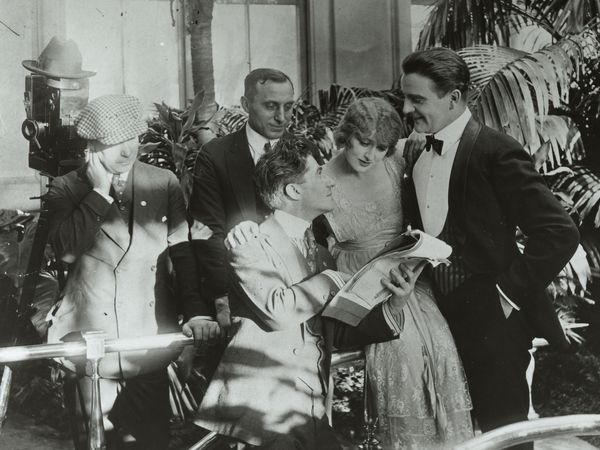HER CODE OF HONOR
John M. Stahl (US 1919)
The opening title of Her Code of Honor, the first of Stahl’s officially credited films to survive, announces the theme of this and of many films to come: “When the call of the heart is heard all else is forgotten” – a theme so central that Call of the Heart was used as an alternative title for the film, and is now appropriated for the book linked to this retrospective. Distinguished stage actress Florence Reed, in the second of three films for Stahl, follows that call twice over: first as a naïve American art student in Paris, Helen, who dies giving birth to the daughter of a caddish married man, and then, two decades later, in the role of the daughter, Alice, who has grown up in America and has to overcome alarming obstacles in order to win happiness.
The first scenes take place, as a second title quickly tells us, in “Paris 1895”. How can one not think at once of the Lumière Brothers, and of that historic date and place for the start of cinema as we know it? Stahl had himself by that date reached the age of eight, and could well have seen some of the first Lumière programmes around that time in Europe or America. It’s as if he is here claiming a place for himself within the rapid historical development of the medium: embracing with relish the still fairly new conventions of the feature film and the extended romantic narrative and the star performer, but rooting his work with equal relish in a recognition of the power of the raw cinematographic image.
Two early scenes can illustrate this. When Helen is informed of the concealed domestic life of her lover, she goes for the first time to his home to investigate, and is shown in by a maid. A small boy is alone is the room, and Helen interacts with him as he shows her a tell-tale photo of his daddy. The mother then enters, and after a brief conversation Helen leaves. Stahl has cut between Helen and the boy and the photo, a lucid use of the – again, relatively new – conventions of reverse shots and point of view. But the encounter with the mother is taken entirely within a cool static wide shot, from the back of the room, a powerful autonomous shot recording the encounter of wife and mistress, their only meeting, one that is de-dramatized in content as in form: anticipating the “other women” of later films like Back Street and Only Yesterday, Alice does not think of confronting and disabusing the wife, but simply pretends she must have come to the wrong house. The integration of styles in this scene is unobtrusive but very assured.
After breaking with her lover, Helen sits distraught at the dining table that is still laid with an uneaten meal. An older man, Tom, an artist from the same building, also American, enters in courtship mode with a bunch of flowers, and takes in the scene before him. It is another static autonomous shot, weighty and eloquent, and again it ends without drama – we move forward to America 1918, and the full story of the shot and the moment and the story behind it will not be taken up until much later in the narrative, when we return in flashback to the same tableau image and wind forward from it.
In his introductory notes to this Stahl series, Bruce Babington refers to the elements of “coincidence, extreme narrative suppression, and revelations of buried family secrets” that are pervasive in the early melodramas. And we certainly get them here. The halting of the dinner-table scene, creating mysteries that will be only gradually unravelled; the extreme coincidence of Alice’s suitor in America turning out to have a close link to her mother’s past in Paris; and the “buried family secrets” that continue to emerge, allowing the roller-coaster of a narrative to come to rest with a return to the words with which it opened, endorsing the primacy of the Call of the Heart.
Working here for a short-lived Manhattan-based company, Stahl would make two more films in the East before moving to Hollywood; reviews indicate that Her Code of Honor was equally well received on both coasts. Its combination of full-blooded emotion with cinematic sophistication, as flagged up in those initial title cards, makes the head-hunting of Stahl by Louis B. Mayer, and his success thereafter, easy to understand.
Charles Barr

regia/dir: John M. Stahl.
scen: Frances Irene Reels.
photog: Harry Fischbeck.
cast: Florence Reed (Helen/Alice), William Desmond (Eugene La Salle), Robert Frazer (Richard Bentham), Irving Cummings (Jacques), Alec B. Francis (Tom Davis), Marcelle Roussillon (Jane), George S. Stevens.
prod: Tribune Productions, Inc.
dist: United Picture Theatres of America, Inc.
uscita/rel: 06.04.1919.
copia/copy: 35mm, 5805 ft., ??’ (?? fps); did./titles: ENG.
fonte/source: BFI National Archive, London.


 Italiano
Italiano